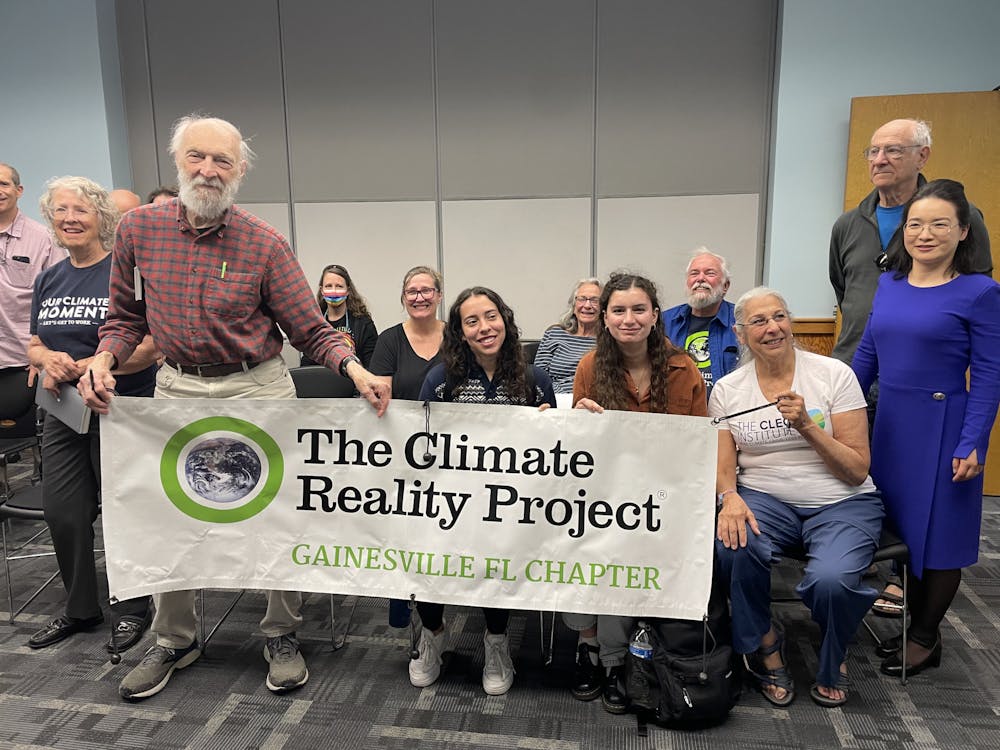The Climate Reality Project and local activists met Monday afternoon to hear an update on Gainesville’s climate action plan from Chief Climate Officer Dan Zhu. The city official outlined the plan and focused on two main aspects: adaptation and mitigation.
“Our goal is to have a comprehensive draft climate action plan by the end of this year,” she said in the meeting. “So we are making significant progress.”
Zhu began her position as the city’s chief climate officer in February 2023, with the purpose of developing a climate action plan. Since her appointment, Zhu has worked on creating a climate change vulnerability assessment, as well as making information about the city’s climate policy more accessible to the public.
The meeting was hosted by the Gainesville chapter of The Climate Reality Project, a national nonprofit organization focused on citizen advocacy. Members of The CLEO Institute, an environmental nonprofit, and other Gainesville residents also attended the meeting.
The mitigation portion of the plan aims to reduce Gainesville’s contribution to global climate change. Most notably, the city has set a goal of net zero greenhouse gas emissions by 2045, and zero waste by 2040.
As part of the city’s climate initiative, Gainesville has begun phasing in electric RTS buses and city-owned vehicles. Out of the city’s 118 buses, four are electric. Gainesville’s goal is to have 80% of its buses electric by 2045, Zhu said.
This initiative was supported by government subsidies such as a $1.2 million grant from the Florida Department of Environmental Protection in March 2023 to buy new electric buses.
The adaptation part of the plan seeks to prepare Gainesville’s citizens for a changing climate. After surveying citizens across the city, two main concerns are extreme heat and food insecurity, Zhu said.
To adapt to a warming world, the city will include measures to improve public warning systems for extreme heat. The city will also try to improve energy efficiency in lower-income households, Zhu said. To help with food insecurity, Gainesville will bolster community gardens, support local farmers markets and reduce food waste.
A major aspect of the plan, Zhu added, is using citizen input from members of the Gainesville community. During the meeting, Zhu fielded questions and took input from citizens attending.
“I definitely feel that we are working together, from our leaders to our communities,” she said.
Climate Reality Project Chairperson Kathleen Walsh Pagan and campaign chair Bob Tancig both voiced concerns about Florida’s climate policies at the meeting. Chief among their concerns was how bills introduced by the state legislature could impact Gainesville’s ability to implement a climate action plan.
House Bill 1645, which established the GRU authority, is especially concerning to Tancig. The bill, which went into effect July 1, could hinder Gainesville’s efforts to move toward green energy, Tancig said.
“It’s just dreadful,” he said. “There’s more to come from Tallahassee.”
While The Climate Reality Project’s meetings stalled during COVID-19, the organization tries to meet regularly for presentations and events, Pagan said. As Zhu and the City of Gainesville further develop a climate action plan, residents are continuing to follow its progress.
“We need to do as much as we can, as soon as we can,” Pagan said.
Contact Kylie Williams at kyliewilliams@alligator.org. Follow her on X @KylieWilliams99.
Kylie Williams is the Spring 2025 Digital Managing Editor and a third-year journalism major. She has also worked as the enterprise editor and the environmental enterprise reporter. In her free time, she can be found reading, baking or watching reality TV with her cat.






